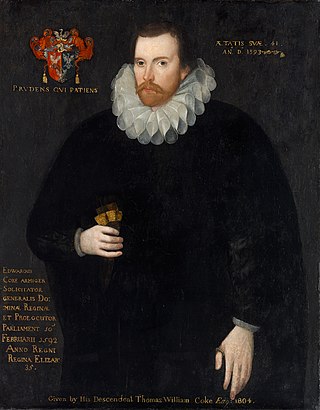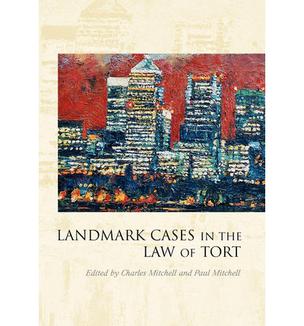Related Research Articles

Sir Edward Coke was an English barrister, judge, and politician who is considered the greatest jurist of the Elizabethan and Jacobean eras.
In laws of equity, unjust enrichment occurs when one person is enriched at the expense of another in circumstances that the law sees as unjust. Where an individual is unjustly enriched, the law imposes an obligation upon the recipient to make restitution, subject to defences such as change of position. Liability for an unjust enrichment arises irrespective of wrongdoing on the part of the recipient. The concept of unjust enrichment can be traced to Roman law and the maxim that "no one should be benefited at another's expense": nemo locupletari potest aliena iactura or nemo locupletari debet cum aliena iactura.
The law of restitution is the law of gains-based recovery, in which a court orders the defendant to give up their gains to the claimant. It should be contrasted with the law of compensation, the law of loss-based recovery, in which a court orders the defendant to pay the claimant for their loss.
Replevin or claim and delivery is a legal remedy, which enables a person to recover personal property taken wrongfully or unlawfully, and to obtain compensation for resulting losses.
In tort law, detinue is an action to recover for the wrongful taking of personal property. It is initiated by an individual who claims to have a greater right to their immediate possession than the current possessor. For an action in detinue to succeed, a claimant must first prove that he had better right to possession of the chattel than the defendant, and second, that the defendant refused to return the chattel once demanded by the claimant.
Trover is a form of lawsuit in common-law countries for recovery of damages for wrongful taking of personal property. Trover belongs to a series of remedies for such wrongful taking, its distinctive feature being recovery only for the value of whatever was taken, not for the recovery of the property itself.

Alperin v. Vatican Bank was an unsuccessful class action suit by Holocaust survivors brought against the Vatican Bank and the Franciscan Order filed in San Francisco, California, on November 15, 1999. The case was initially dismissed as a political question by the District Court for the Northern District of California in 2003, but was reinstated in part by the Court of Appeals for the Ninth Circuit in 2005. That ruling attracted attention as a precedent at the intersection of the Alien Tort Claims Act (ATCA) and the Foreign Sovereign Immunities Act (FSIA).
Actio personalis moritur cum persona is a Latin expression meaning "a personal right of action dies with the person".
Charles Christopher James Mitchell KC (Hon) is a British legal scholar acknowledged as one of the leading common-law experts on the English law of restitution of unjust enrichment and the law of trusts. He is the author of two leading textbooks and one practitioner's book. He is currently Professor of Law at University College London and Senior Associate Research Fellow at the Institute of Advanced Legal Studies.
Conversion is an intentional tort consisting of "taking with the intent of exercising over the chattel an ownership inconsistent with the real owner's right of possession". In England & Wales, it is a tort of strict liability. Its equivalents in criminal law include larceny or theft and criminal conversion. In those jurisdictions that recognise it, criminal conversion is a lesser crime than theft/larceny.
The English law of unjust enrichment is part of the English law of obligations, along with the law of contract, tort, and trusts. The law of unjust enrichment deals with circumstances in which one person is required to make restitution of a benefit acquired at the expense of another in circumstances which are unjust.
Change of position is a defence to a claim in unjust enrichment which operates to reduce a defendant's liability to the extent to which his or her circumstances have changed as a consequence of an enrichment.
The English law of Restitution is the law of gain-based recovery. Its precise scope and underlying principles remain a matter of significant academic and judicial controversy. Broadly speaking, the law of restitution concerns actions in which one person claims an entitlement in respect of a gain acquired by another, rather than compensation for a loss.
Landmark Cases in the Law of Contract (2008) is a book by Charles Mitchell and Paul Mitchell, which outlines the key cases in English contract law.
Landmark Cases in Equity (2012) is a book edited by Charles Mitchell and Paul Mitchell, which outlines the key cases in English trusts law and equity.

Landmark Cases in the Law of Tort (2010) is a book edited by Charles Mitchell and Paul Mitchell, which outlines the key cases in English tort law.
Landmark Cases in the Law of Restitution (2006) is a book edited by Charles Mitchell and Paul Mitchell, which outlines the key cases in English unjust enrichment law and restitution.
Landmark Cases in Family Law (2011) is a book of chapters contributed by various authors, which outlines the key cases in English family law.

Moses v Macferlan (1760) 2 Bur 1005 is a foundational case in the law of restitution holding that in certain circumstances such as when money is paid by mistake, for failed consideration or under oppression; the law will allow the money to be recovered.
Phillips v Homfray is an important landmark decision in English law of restitution.
References
- ↑ Charles Mitchell, Paul Mitchell, Landmark Cases in the Law of Restitution (Bloomsbury Publishing, 18 Apr. 2006) p168
- ↑ Hambly v. Trott(1776) 1 Cowper 371.
- ↑ Edward Coke, J. H. Thomas, John Farquhar Fraser The Reports of Sir Edward Coke: In Thirteen Parts [1826] (The Lawbook Exchange, Ltd., 2002). p73
- ↑ Charles Mitchell, Paul Mitchell, Landmark Cases in the Law of Restitution (Bloomsbury Publishing, 18 Apr. 2006) p168
- ↑ Charles Mitchell, Paul Mitchell, Landmark Cases in the Law of Restitution(Bloomsbury Publishing, 2006).
- ↑ Charles Mitchell, Paul Mitchell, Landmark Cases in the Law of Restitution (Bloomsbury Publishing, 2006) .